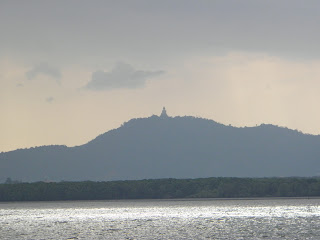"When we deliberately leave the safety of the shore of our lives we surrender to a mystery beyond our intent."
-Anne Linea, "Deep Water Passage"
On the crossing back to Phuket, I study the waves intently. By this time tomorrow I will be on them and, feeling their impact on this large vessel, I am beginning to feel more than a little trepidation. I've never paddled a sea kayak before and I've never seen waves quite like these. They're not necessarily high but they seem crowded and hurried, their white caps breaking one on top of the other. I'm starting to think I may be getting in over my head.
I open the book I've brought with me and been power reading through. At times the author spirals into territory far too intimate for me but I find the story of her, often solo, paddle around the notoriously vicious Lake Superior, riveting, informative and reassuring.
I am a self taught paddler. It was my Aunt who suggested it. I had been lamenting the loss of the great love of my life saying, "I'll get over him, eventually (I was young and foolish and still believed that then) but I miss having a paddling partner. I'm not skilled enough to canoe by myself."
Aunt Jude stared at me like I'd obviously lost my senses. "Why don't you kayak?"
Now it was my turn to stare at her dumbfounded. "Well," I said slowly, "I've never tried it, it hadn't occurred to me."
"You've never kayaked? Oh, well, you absolutely must. There's something about it, being that close to the water, it's hard to explain." She paused for a moment, searching for the right words. "There's something sacred about it," she finally continued, "like baking bread. It's an ordinary action that's somehow extraordinary; it connects you, grounds you, reminds you that you are a part of something so much bigger than you."
Many members of my family have shared many amazing gifts with me, but this revelation was one that changed my life. I understood exactly what she meant about the process of baking bread. It's something that's been happening for thousands of years, a process that's been handed down and perfected for hundreds of generations. Every time I work a bowl of dough, combining water, eggs, yeast and flour -such a simple recipe really-it feels like I'm subverting a system that wants me to forget not only the simple pleasures in life, like the yeasty smell of bread rising in warm kitchen on a sunny winter's day, but my connection to the past and the future. Her description resonated with me profoundly and, if a kayak could bring me a similar experience, I was certainly not going to pass up the opportunity.
So, a few weeks later, on a September long weekend, I rented a kayak from the general store and set out on the water of Rushing River. It was everything my Aunt had advertised and more. At first I was terrified, convinced I would over stroke and capsize into the autumnally frigid water. It is, after all, the slyness of a kayak, that it rocks, and sways and generally does not inspire confidence; it deceives you into thinking that by all rights, it should not be water worthy. But, after the first ten minutes, you start to believe it just might let you sit that close to the water without falling in. After twenty you start to relax into it. After thirty you’ve forgotten that, much like humans should not, in theory, be able to fly, it is equally unnatural to be so close to the water and not be wet. You fall into a rhythm, the paddles and water and you become one, and you lose yourself in the fiery colours of fall reflected on the river’s surface from the rocky shore.
But paddling a river is one thing, a lake is another and a feisty, incessant sea is something else altogether. Lake Superior can be described as an inland sea, a lake so vast the waters behave like those of unbounded seas, water who's nature and temperament I know very little about. Fortunately the author, in recounting her journey around the lake, details strategies to overcome unpredictable waves, read the water, and count waves to make a safe landing and launch. I read these passages like a how-to manual, as if cramming before a final exam, knowing full well that, in the end, all I’ll really be able to do is trust my instincts. It’s a fortunate book to have found when I most needed some expert instruction but more than that it transports me back home.
There are moments I think I might drown in waves of homesickness; descriptions of “Old Woman’s Bay”, only a short drive from where I spent my last glorious summer, and the familiar shorelines along the Canadian Shield make me long for the scent of pine trees and cool summer nights spent under the stars. Still, there’s a comfort in remembering home and knowing, through these pages, there’s someone else in the world as enamoured with my homeland as me. I haven’t met anyone here who can relate to or even begin to imagine the majesty of a place with space enough to go for an entire day without seeing another human being; a place where people, accustomed to the treacheries of an often unpredictable climate and untamed landscape, are, on the whole, friendly, trusting and trustworthy. They will, as the American author discovers and marvels, be happy to help if you need. Yeah, I think proudly, reading about the friendly, generous Canadians she meets along the way, those are my people; that’s where I come from.
Most comforting of all is the knowledge that there’s at least one other woman in the world who has ventured out into a foreign wilderness alone and survived. Every time I look out at the sea, and the shark stories and nervous doubts start to creep in, the book serves to remind me: If she can do it, I can do it.
















